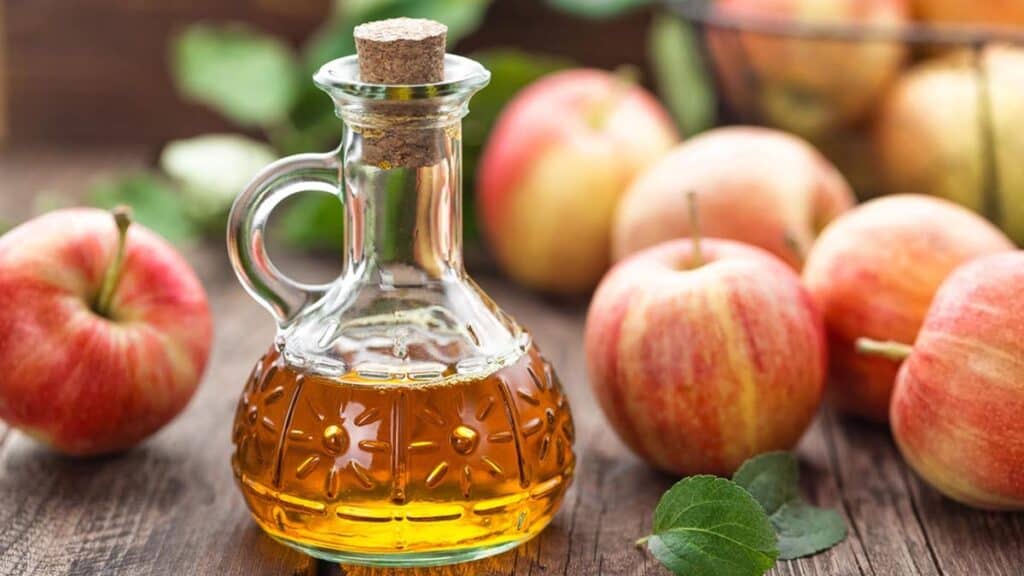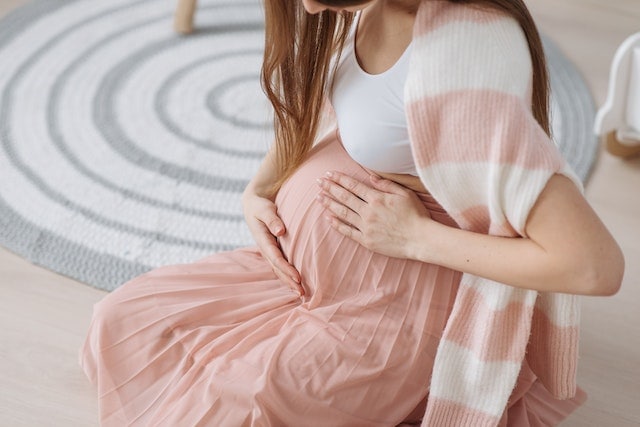Pregnancy is a time when many women pay close attention to their diets and health habits. One controversial health trend some individuals may consider, even while pregnant, is the consumption of unpasteurized apple cider vinegar.
Unpasteurized apple cider vinegar (ACV) is a type of vinegar made from fermented apples that has not undergone a pasteurization process, which kills potentially harmful bacteria. Advocates for unpasteurized ACV claim numerous health benefits; however, there are also risks to be aware of, especially during pregnancy.
It is crucial to understand the potential risks of consuming unpasteurized ACV while pregnant, as well as guidelines and alternatives to ensure the safety of both mother and baby.
This article delves into the subject and offers insight into the topic of drinking unpasteurized apple cider vinegar during pregnancy, making it easier for readers to make informed decisions regarding their health and well-being throughout this delicate time.
Key Takeaways
- Unpasteurized apple cider vinegar is a controversial health trend with potential risks during pregnancy.
- It’s important to know the guidelines for drinking ACV while pregnant to ensure safety.
- Consider alternative remedies for maintaining health and well-being during pregnancy.
Understanding Unpasteurized Apple Cider Vinegar

What is Unpasteurized ACV
Unpasteurized apple cider vinegar (ACV) is a type of vinegar made from fermented apples. Unlike pasteurized versions, it has not undergone heat treatment to kill off bacteria and yeast, preserving its raw and natural state.
Bacteria and Yeast in ACV
The fermentation process of ACV involves the action of beneficial bacteria and yeast. These microorganisms convert the natural sugars in apples into acetic acid, which gives vinegar its characteristic taste and acidity.
In unpasteurized ACV, these bacteria and yeast are still present and can have potential health benefits.
The ‘Mother’ in ACV
The ‘Mother’ in unpasteurized ACV is a naturally occurring substance composed of proteins, enzymes, and beneficial bacteria. It appears as floating strands or a cloudy sediment in the vinegar. The presence of the ‘Mother’ is a sign of a high-quality, raw, and unfiltered product.
Benefits of Unpasteurized ACV
Unpasteurized ACV is considered to have several health benefits due to the presence of the ‘Mother’ and the beneficial bacteria and yeast. Some potential benefits include:
- Improved digestion
- Enhanced immune function
- Balanced blood sugar levels
- Better nutrient absorption
It is important to note that more research is needed to support these claims, and individual experiences may vary.
Unpasteurized vs Pasteurized ACV
The main difference between unpasteurized and pasteurized ACV lies in the processing methods. Pasteurized ACV is heated and filtered, removing the ‘Mother’ and killing off beneficial bacteria and yeast. This results in a clear, shelf-stable product with a milder taste.
In contrast, unpasteurized ACV retains the ‘Mother’ and the living microorganisms, which contribute to its potential health benefits.
However, it is essential to be cautious when consuming unpasteurized ACV, especially during pregnancy, as raw products may contain harmful bacteria. Always consult a healthcare professional before adding it to your diet.
ACV and Pregnancy

Why Pregnant Women Might Use ACV
During pregnancy, many women experience several discomforts and symptoms that may affect their daily lives. Some pregnant women may seek home remedies like Apple Cider Vinegar (ACV) for relief from these common symptoms.
ACV is a popular natural remedy that has been used for various health benefits, but it is imperative to consider the safety of its use during pregnancy.
Possible Benefits for Pregnancy Symptoms
ACV is known to contain acetic acid and potassium, which can have a positive impact on digestion and the immune system. Some pregnant women may use ACV to:
- Alleviate morning sickness and nausea: Diluting ACV with water and drinking it may provide relief from these common pregnancy symptoms.
- Aid digestion: ACV is believed to help with digestion by breaking down food more efficiently, which could potentially relieve bloating and heartburn.
- Support the immune system: The potassium content in ACV may contribute to a boosted immune system, making it easier for pregnant women to avoid catching illnesses.
Current Research on ACV Use in Pregnancy
While ACV has been used as a home remedy for various purposes, research on its safety and efficacy during pregnancy is limited. Some studies suggest that consuming small amounts of ACV may be safe during pregnancy, provided it is diluted with water and consumed in moderation.
However, it is essential to speak with a doctor before incorporating ACV into a pregnancy wellness routine.
It is worth noting that unpasteurized ACV might contain harmful bacteria that can cause complications for pregnant women and their babies. Pregnant women are advised to choose a pasteurized ACV option to minimize the potential risks.
In conclusion, ACV might offer some relief from pregnancy symptoms, but further research is needed to determine its safety and effectiveness during pregnancy. Pregnant women should always consult with their doctor before using ACV or any other home remedy.
Potential Risks of Consuming Unpasteurized ACV During Pregnancy
Risk of Foodborne Illness
Unpasteurized apple cider vinegar (ACV) may contain harmful bacteria such as Listeria, Salmonella, and Toxoplasma. These bacteria can lead to foodborne illness, which can be especially dangerous for pregnant women.
Ingesting unpasteurized ACV may pose a risk to both the mother and the developing fetus.
- Listeria: This bacterium can cause a severe infection known as listeriosis. Pregnant women are more susceptible to listeriosis, which can lead to miscarriage, stillbirth, or severe complications in newborns.
- Salmonella: Consuming products contaminated with Salmonella can cause salmonellosis, a form of food poisoning. Symptoms can include fever, diarrhea, vomiting, and abdominal pain. In severe cases, it can lead to hospitalization and even life-threatening complications for both the mother and baby.
- Toxoplasma: This parasite can be found in some unpasteurized products and can cause toxoplasmosis. Although rare, it may lead to serious complications for the unborn child, such as vision problems, hearing loss, or intellectual disabilities.
Other Possible Health Complications
Apart from the risk of foodborne illnesses, consuming unpasteurized ACV during pregnancy may contribute to other health complications.
- Digestive issues: Unpasteurized ACV is acidic, which can cause gastric problems like heartburn, indigestion, or even acid reflux. Pregnant women are more prone to these issues due to hormonal and anatomical changes.
- Tooth enamel erosion: The acidity in unpasteurized ACV can also be harmful to tooth enamel. Pregnant women may experience increased dental sensitivity and a higher risk of cavities.
- Drug interactions: ACV may interact with certain medications, including some that are commonly taken during pregnancy. It is essential to consult a healthcare provider before consuming unpasteurized ACV while on medication.
In conclusion, it is best to exercise caution and consult with a healthcare professional before deciding to consume unpasteurized apple cider vinegar during pregnancy to avoid potential risks and complications.
Guidelines for Drinking ACV while Pregnant

How to Safely Consume ACV During Pregnancy
Pregnant women should exercise caution while consuming apple cider vinegar (ACV). To safely consume ACV during pregnancy, it is essential to choose the right type of vinegar and follow proper dilution guidelines.
Pregnant women should always opt for pasteurized ACV, as it has undergone a heating process to kill harmful bacteria. Unpasteurized ACV may contain harmful bacteria like E. Coli, which can pose risks to the mother and baby during pregnancy.
To consume ACV safely, dilute it with water, following the ratio of 1-2 tablespoons of ACV per 8 ounces of water. Drinking undiluted ACV can lead to tooth enamel erosion and stomach discomfort. It may also negatively affect the body’s acid-base balance.
It is crucial to always drink diluted ACV and limit consumption to one glass per day.
Different Types of ACV
Understanding the various types of ACV is important for pregnant women. They can generally choose from four basic classifications:
- Raw ACV: This type of vinegar undergoes minimal processing and contains the “mother”, a cloudy substance composed of enzymes, proteins, and good bacteria. Raw ACV can be beneficial for gut health, but pregnant women should avoid consuming it.
- Filtered ACV: The process of filtration removes the “mother” and any sediment, leaving a clear liquid. Filtered ACV can be a safe option for pregnant women, provided it is also pasteurized.
- Unfiltered ACV: Unfiltered ACV still contains the “mother” and sediment. While it may be more nutritious than filtered ACV, it may not be pasteurized and, hence, should not be consumed during pregnancy.
- Organic ACV: This type of vinegar is made from organically grown apples and is likely to be free of pesticides and chemicals. Organic ACV can be raw, filtered, or unfiltered and can vary in quality, so it is essential to choose a reputable brand and ensure it is pasteurized to ensure safety during pregnancy.
Pregnant women must pay close attention to the label of the ACV before consumption. They should look for a trusted brand that uses pasteurized juice instead of unpasteurized juice.
Following these guidelines and consulting a healthcare professional before adding ACV to the diet will ensure that pregnant women enjoy its benefits without risking their health or the wellbeing of their baby.
Alternatives to Drinking ACV during Pregnancy
Safe Alternatives for Heartburn Relief
Pregnant women often experience heartburn, and it’s natural to seek relief. While some may turn to apple cider vinegar (ACV), it’s essential to choose safe alternatives during pregnancy.
Antacids, such as Tums or Rolaids, are over-the-counter medications that can provide relief without posing risks. Consult your healthcare provider before taking any antacids.
Including certain snacks in your diet may help alleviate heartburn as well. Consuming low-acid foods, like salad, and avoiding high-acid items such as orange juice can reduce discomfort. Opting for apple juice instead of ACV is another safe choice for pregnant women.
Understanding Other Home Remedies
Aside from heartburn relief, pregnant women may explore various home remedies for other common issues. It’s crucial to weigh the risks and benefits of these remedies to ensure the wellbeing of both mother and baby.
For instance, using cold compresses or mild lotions can help alleviate itchiness caused by skin stretching during pregnancy. Gentle stretches or prenatal massages can also ease muscles and back pain without relying on potentially harmful substances.
Make sure to consult your healthcare provider for personalized advice on safe remedies during pregnancy.
Conclusion
Pregnant women should always be cautious about the food and drinks they consume. Unpasteurized apple cider vinegar, though it has some health benefits, may not be advisable for pregnant women due to potential risks.
It is important to highlight that unpasteurized apple cider vinegar may contain harmful bacteria, such as E. coli or Salmonella, which can lead to serious complications for both the mother and the baby.
Pasteurization eliminates these bacteria, making the product safer for consumption.
Furthermore, pregnant women with gestational diabetes or blood sugar concerns should be aware that apple cider vinegar may affect their blood sugar levels. Consulting a healthcare professional before including it in the diet is essential.
While some may believe that the health benefits of apple cider vinegar outweigh the risks, it is crucial for pregnant women to prioritize their safety and the well-being of their baby. Opting for pasteurized apple cider vinegar or alternative sources of the same nutrients might be a more prudent choice.
In conclusion, expecting mothers should think twice before consuming unpasteurized apple cider vinegar, considering its potential risks to their pregnancy. It is always wise to seek professional guidance and choose safe options to provide the best possible care for oneself and the baby.
Related posts:
Frequently Asked Questions
Is it safe to consume unpasteurized ACV during pregnancy?
While some people believe that apple cider vinegar (ACV) has health benefits, it is important to discuss with your healthcare provider before consuming unpasteurized ACV during pregnancy.
Unpasteurized ACV may contain harmful bacteria, such as E. coli or Listeria, which can pose risks to both pregnant women and their unborn babies.
What are the risks of drinking unpasteurized ACV while pregnant?
The primary risk of consuming unpasteurized ACV during pregnancy is the potential presence of harmful bacteria. Ingesting these bacteria can lead to foodborne illnesses like listeriosis or E. coli infection, which may cause miscarriage, premature labor, or other complications for both mother and baby.
Are there any benefits of apple cider vinegar during pregnancy?
Some studies suggest that apple cider vinegar may help control blood sugar levels, improve digestion, or manage weight gain during pregnancy. However, more research is needed to confirm these findings.
It’s crucial to consult with your healthcare provider before incorporating ACV into your diet while pregnant.
Can unpasteurized ACV affect my baby’s health?
Yes, consuming unpasteurized ACV during pregnancy can pose risks to your baby’s health. As mentioned earlier, harmful bacteria found in unpasteurized ACV may lead to serious complications, such as miscarriage or preterm labor, and can potentially harm your baby’s development and overall health.
Is pasteurized apple cider vinegar a safer choice during pregnancy?
Pasteurized ACV undergoes a heating process that kills harmful bacteria, making it a safer option compared to unpasteurized ACV. However, you should still consult your healthcare provider before consuming any type of ACV during pregnancy to ensure it’s safe for both you and your baby.
Are apple cider vinegar pills safe to take while pregnant?
The safety of apple cider vinegar pills during pregnancy is unclear, as there is limited research on this topic. It’s essential to talk with your healthcare provider before taking ACV pills or any other dietary supplements while pregnant to ensure they are safe and appropriate for your situation.

Iesha is a loving mother of 2 beautiful children. She’s an active parent who enjoys indoor and outdoor adventures with her family. Her mission is to share practical and realistic parenting advice to help the parenting community becoming stronger.
